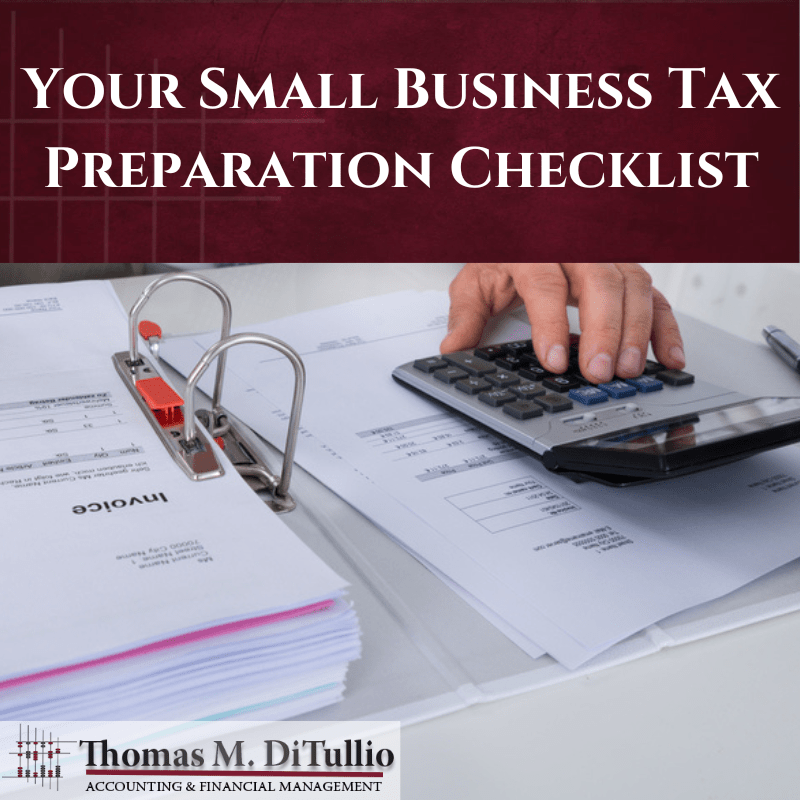Your Small Business Tax Preparation Checklist
Small business owners should ideally prepare for tax filing season year-round. Planning can help to simplify the tax filing process and help small business owners to take advantage of potential deductions and credits for which they might qualify. As the tax season draws near, it is important to ensure you understand the various deadlines that apply and the documents you should gather. At TMD Accounting, part of our small business accounting services includes helping our clients prepare and file their business tax returns. Here’s a checklist that can help you get a jump on the upcoming tax season.
1. Know the Forms You Will File
The tax form your business will file depends on the legal entity structure you have chosen as follows:
- Sole proprietorship – Schedule C with your individual Form 1040
- Limited liability company (LLC) with one member- Schedule C filed with your individual Form 1040
- LLC with more than one member – Form 1065
- Partnership – Form 1065
- S-corporation – Form 1120-S
- C-corporation – Form 1120
Additional schedules and forms might also need to be attached based on the credits and deductions you claim and the types of income you need to report.
2. Information to Gather
Before it is time to file, you should gather the following information to make the process easier:
- Employer identification number (EIN) or Social Security number
- Business’s legal name
- Business address
- Business principal activity code from the chart in the instructions for
- Schedule C
- Income information from your business, including from sales, property sales, collected rent, dividends, interest, canceled debt, allowances, returns, and other income
- Cost of goods sold for a deduction if your business sells products with a beginning and ending inventory by using the worksheet in IRS Publication 334, Chapter 6 to calculate it
- Business expenses, including utilities, advertising, vehicle expenses, mileage, fees and commissions, contractor labor, depreciation, insurance, employee benefits, professional fees, legal fees, office expenses, employee wages, license, taxes, and others
- Information broken down by location if you have locations in several states
Gathering this information can be simple if you use small business accounting software. If you haven’t kept good records, you might need to recreate them by using your bank statements, credit card statements, receipts, and other types of documentation.
3. Issue 1099s if Necessary
If you hired independent contractors or freelancers and paid them $600 or more during the tax year, you need to issue Form 1099-MISC to each one. This is a form used to report payments for work performed by non-employees and independent contractors. You aren’t required to issue a Form 1099-MISC if you paid a contractor through a third-party payment network such as PayPal. In that case, the payments will be reported by the payment processor on Form 1099-K. You can either print Form 1099-MISC through your accounting software or purchase blank forms from a local office supply store. Your accounting firm can also supply these forms for your business.
4. Know Your Other Small Business Tax Obligations
Small businesses also need to be aware of their other tax obligations and returns beyond the federal income tax, including the following:
- Employment tax withholdings – Must be filed with the IRS along with quarterly payroll tax reports
- Unemployment taxes – Paid by the employer without deduction from employees’ wages
- Self-employment taxes – Covers the Medicare and Social Security taxes for self-employed people and must be paid quarterly together with estimated taxes
- Excise taxes – Must be paid on certain types of activities or goods
- Sales taxes – Might be required to collect and remit sales taxes to the state or local government
- Property taxes – Local and state property taxes for your business property if you own it
5. Know the Filing Deadline
The filing deadline depends on the form you file. S-corporations, partnerships, and LLCs with more than one member that file Forms 1120-S or 1065 have a tax filing deadline of March 15. If this date falls on a weekend or holiday, your return must be filed by the next business day.
If you operate as a single-person LLC or a sole proprietor, you report your business income on Schedule C of your individual tax return. In that case, file Form 1040 and Schedule C by April 15. If it falls on a weekend or holiday, your return must be filed by the following business day.
6. Request an Extension if Necessary
If you can’t file your return on time, ask for an automatic extension. Single-member LLCs and sole proprietors can request an extension on Form 4868. Other business types use Form 7004 to request extensions.
An extension will give you an additional six months to file your return. However, if you owe money, your deadline for paying what you owe doesn’t change. Try to estimate what you owe and pay it by the original deadline so that you won’t be assessed penalties and interest.
Find an Accountant for My Small Business
While this tax preparation checklist can help you prepare for filing your taxes, working with an experienced accounting professional at TMD Accounting can make the tax process much more manageable. Contact us today to request a consultation at 1-856-228-2205.

